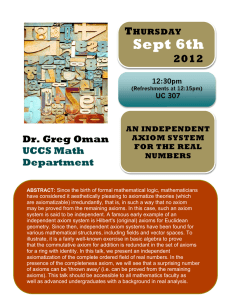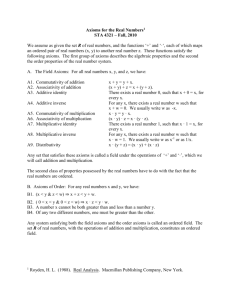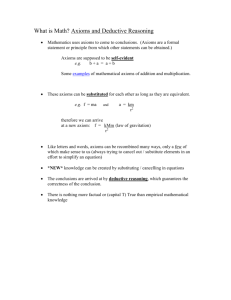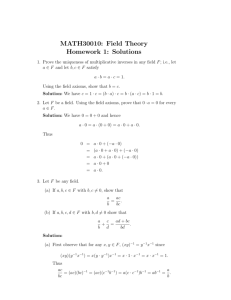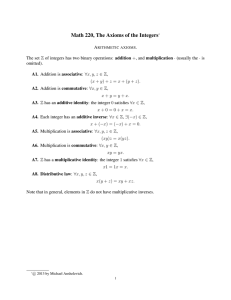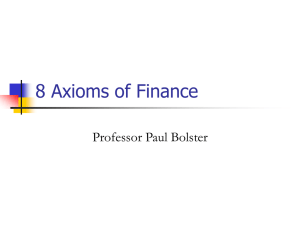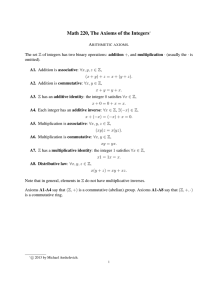Field Axioms and Consequences: Lecture Notes
advertisement
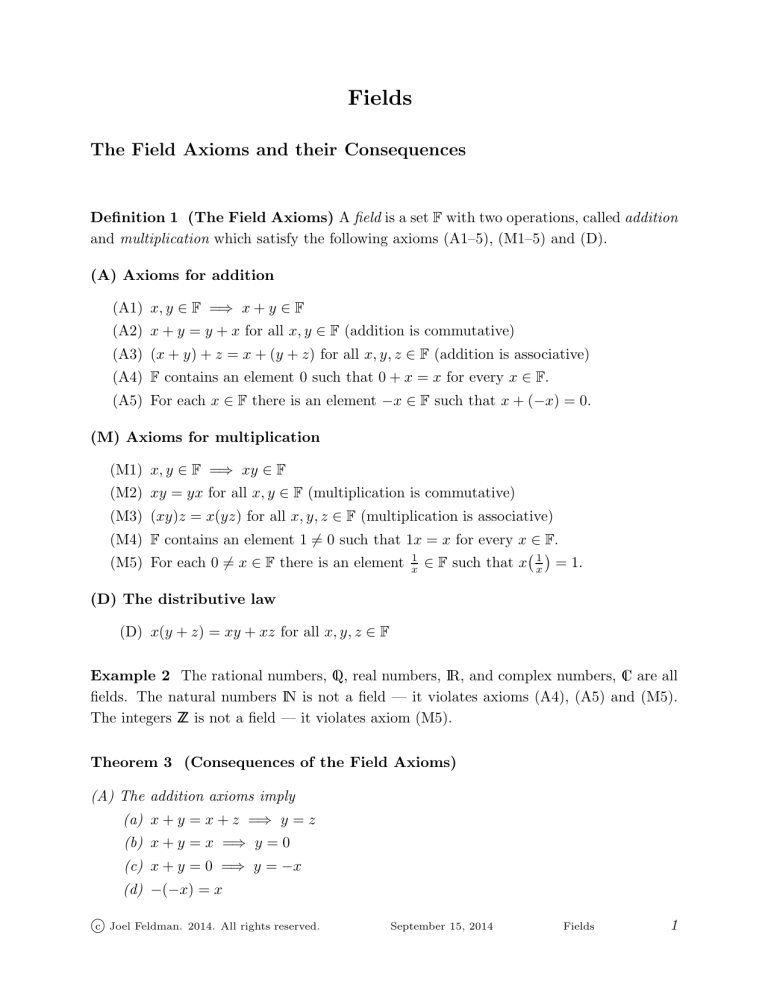
Fields
The Field Axioms and their Consequences
Definition 1 (The Field Axioms) A field is a set F with two operations, called addition
and multiplication which satisfy the following axioms (A1–5), (M1–5) and (D).
(A) Axioms for addition
(A1) x, y ∈ F =⇒ x + y ∈ F
(A2) x + y = y + x for all x, y ∈ F (addition is commutative)
(A3) (x + y) + z = x + (y + z) for all x, y, z ∈ F (addition is associative)
(A4) F contains an element 0 such that 0 + x = x for every x ∈ F.
(A5) For each x ∈ F there is an element −x ∈ F such that x + (−x) = 0.
(M) Axioms for multiplication
(M1) x, y ∈ F =⇒ xy ∈ F
(M2) xy = yx for all x, y ∈ F (multiplication is commutative)
(M3) (xy)z = x(yz) for all x, y, z ∈ F (multiplication is associative)
(M4) F contains an element 1 6= 0 such that 1x = x for every x ∈ F.
(M5) For each 0 6= x ∈ F there is an element x1 ∈ F such that x x1 = 1.
(D) The distributive law
(D) x(y + z) = xy + xz for all x, y, z ∈ F
Example 2 The rational numbers, Q, real numbers, IR, and complex numbers, C are all
fields. The natural numbers IN is not a field — it violates axioms (A4), (A5) and (M5).
The integers ZZ is not a field — it violates axiom (M5).
Theorem 3 (Consequences of the Field Axioms)
(A) The addition axioms imply
(a) x + y = x + z =⇒ y = z
(b) x + y = x =⇒ y = 0
(c) x + y = 0 =⇒ y = −x
(d) −(−x) = x
c Joel Feldman. 2014. All rights reserved.
September 15, 2014
Fields
1
(M) The multiplication axioms imply
(a) x 6= 0, xy = xz =⇒ y = z
(b) x 6= 0, xy = x =⇒ y = 1
(c) x 6= 0, xy = 1 =⇒ y = x1
(d) x 6= 0, 1/(1/x) = x
(F) The
(a)
(b)
(c)
(d)
field axioms imply
0x = 0
x 6= 0, y 6= 0 =⇒ xy 6= 0
(−x)y = −(xy) = x(−y)
(−x)(−y) = xy
Selected Proofs:
(A.a):
x + y = x + z =⇒ −x + (x + y) = −x + (x + z)
=⇒ (−x + x) + y = (−x + x) + z
=⇒ x + (−x) + y = x + (−x) + z
(by axiom (A3))
(by axiom (A2))
=⇒ 0 + y = 0 + z
(by axiom (A5))
=⇒ y = z
(by axiom (A4))
(F.a):
0 · x = (0 + 0)x
=0·x+0·x
=⇒ 0 · x = 0
(by axiom (A4))
(by axiom (D))
(by part A.b, above)
(F.b):
x 6= 0, xy = 0 =⇒
1
x
(xy) = x1 0 = 0 (by part F.a and axiom (M2))
=⇒ y = 0
(by axioms (M3), (M2), (M5), (M4))
(F.c): As a preliminary computation we show that (−1)x = −x. By part (A.c), this
follows from
x + (−1)x = 1 · x + (−1)x = (1 + (−1))x = 0 · x = 0
(by axioms (M4), (M2), (D), (A5) and part (F.a)). This implies
(−x)y = (−1)x y = (−1)(xy) = −(xy)
x(−y) = x (−1)y = (−1)(xy) = −(xy)
c Joel Feldman. 2014. All rights reserved.
September 15, 2014
Fields
2
Ordered Fields
Definition 4 (Ordered Fields) An ordered field is a field F with a relation, denoted <,
obeying the
(O) Order axioms
(O1) For each pair x, y ∈ F precisely one of x < y, x = y, y < x is true.
(O2) x < y, y < z =⇒ x < z
(O3) y < z =⇒ x + y < x + z
(O4) x > 0, y > 0 =⇒ xy > 0
We also use the notations “x > y” for “y < x”, and “x ≤ y” for “x < y or x = y”, and
“x ≥ y” for “y < x or x = y”.
An ordered set is a set with a relation < obeying (O1) and (O2).
Example 5 Q and IR are ordered fields.
Theorem 6 (Consequences of the Order Axioms) In every ordered field
(a) x > 0 =⇒ −x < 0
(b) x < 0 =⇒ −x > 0
(c) y < z, x > 0 =⇒ xy < xz
(d) y < z, x < 0 =⇒ xy > xz
(e) x 6= 0 =⇒ x2 > 0
(f ) 1 > 0
(g) x > 0 =⇒ x1 > 0
(h) 0 < x < y =⇒ 0 < y1 < x1
Proof:
(O3)
(A4),(A5)
(O3)
(A4),(A5)
(a) x > 0 =⇒ x + (−x) > 0 + (−x)
(b) x < 0 =⇒ x + (−x) < 0 + (−x)
(c) y < z
(O3),(A2,5)
=⇒
=⇒
=⇒
(O4)
0 > −x
0 < −x
(D)
z − y > 0 =⇒ x(z − y) > 0 =⇒ xz − xy > 0
(O3),(A2,4,5)
=⇒
xz > xy
0
z }| { (D)
(d) x < 0, z − y > 0 =⇒ (z − y)x < (z − y)(0) =⇒ xz − xy < 0
(c)
(O4)
(b)
(O3),(A4),(A5)
=⇒
xy > xz
(O4)
(e) x > 0 =⇒ x2 > 0 and x < 0 =⇒ − x > 0 =⇒ x2 = (x)2 > 0
(e)
(f) 1 = 12 =⇒ 1 > 0
c Joel Feldman. 2014. All rights reserved.
September 15, 2014
Fields
3
(O4)
(g) Let x > 0. If x1 < 0, then − x1 > 0 =⇒
contradicts part (e).
(h) Multiply both sides of x < y by
gives y1 > 0.
1 1
xy
−
1
x
(a)
x > 0 =⇒ −1 > 0 =⇒ 1 < 0 which
> 0. This gives, by part (c),
1
y
<
1
.
x
Part (f)
Theorem 7 (C cannot be ordered.) There does not exist a relation < making C into
an ordered field.
Proof:
Homework.
c Joel Feldman. 2014. All rights reserved.
September 15, 2014
Fields
4
